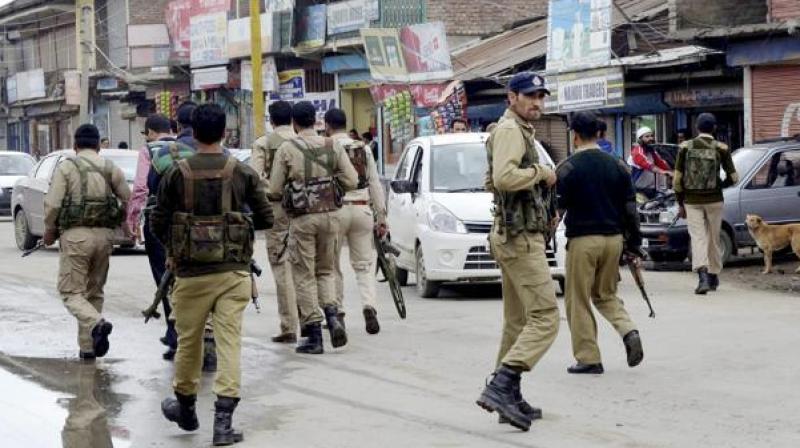Afzal Guru death anniversary: Security upped in J&K amid shutdown by separatists

Srinagar: Security forces are enforcing a lockdown in parts of Jammu and Kashmir’s summer capital Srinagar to hold back protests planned on the death anniversary of Parliament attack convict Muhammad Afzal Guru.
Guru, a resident of Doabgah suburb of Kashmir’s north-western town of Sopore, was hanged to death in Delhi’s Tihar jail on February 9, 2013.
Though J&K’s Director General of Police, S.P. Vaid, said that no curfew as such has been clamped on any part of the Valley and that only “mild restrictions” are being enforced in few police stations areas of central Srinagar, huge contingents of CRPF and local police personnel with riot gear were at dawn fanned out to enforce security lockdown in areas considered as politically volatile.
At places in the heart of old Srinagar including Gojwara and Mashali Mohalla, Hawal, Concertina razor wire has been laid on the main roads and to block some side streets.
Police sources said that while a red alert stands valid for all major towns of Kashmir Valley for next three days, security restrictions have been ordered for seven police stations areas of Srinagar for Thursday and Saturday and for the City centre Lal Chowk and its neighbourhood for Friday.
Partial security restrictions have been imposed in some other equally sensitive parts of the Valley too. A report from Sopore said that hundreds of security personnel in riot gear are out on the streets as people in large numbers began visiting Guru’s family in Doabgah early in the morning to share its sorrow and join a prayer meeting.
Elsewhere in the Muslim-majority Valley, the separatists’ call for a shutdown to commemorate the Guru execution is being obeyed widely by the people by suspending work. While shops and other businesses are closed, only skeleton transport services are plying on select routes. The rail services through the Valley have also been suspended “as a precautionary measure”, officials said.
A tight security umbrella has been put up especially around the summer headquarters of the United Nations Military Observers in India and Pakistan (UNMOIP) in Srinagar’s Gupkar Road in view of the call issued by an alliance of separatist leaders asking people to converge at it on Friday to demand plebiscite.
The alliance has also renewed the separatists’ demand that the mortal remains of Guru and those of pro-independence Jammu Kashmir National Liberation Front (JKLF) cofounder Muhammad Maqbool Butt be returned so that they are given a “decent and befitting burial’ in the Valley.
Butt charged with murder of an Indian intelligence officer Amar Chand in Bomai area of Sopore way back in mid-1960s was also executed in Delhi Tihar jail in 1984 and like Guru his mortal remains were buried inside the prison premises.
Ahead of the Guru and Butt anniversaries, key separatist leaders have been placed under house arrest or detained in police stations. Some others including Muhammad Yasin Malik have gone underground. Also, the police has taken dozens of known or potential ‘stone-pelters’ into preventive custody.
The restrictions called ‘mild’ by the authorities in force in Srinagar are likely to continue through February 11 which is observed as ‘black day" in Kashmir to mark the death anniversary of Butt.
However, a senior police official said that a review meeting would be held on each evening during these three days to decide on amount of restrictions to be imposed next day under Section 144 CrPc and any other measures as warranted by the ground situation.
On Wednesday, the police chief, Vaid, was in Srinagar to hold a meeting with senior police and State and Central security forces and intelligence agencies officials. He called for “efficient measures” for maintaining peace and order. He said that coordination was imperative to make such efforts successful while ensuring law and order in the State.
“The safety and security of the people is our prime concern and every attempt of the elements inimical to peace would be foiled firmly," he said. He added that days of imposing curfews are gone and that instead “innovative mechanism” has been put in place by the law enforcing agencies “to foil the ill designs of anti national elements”.

